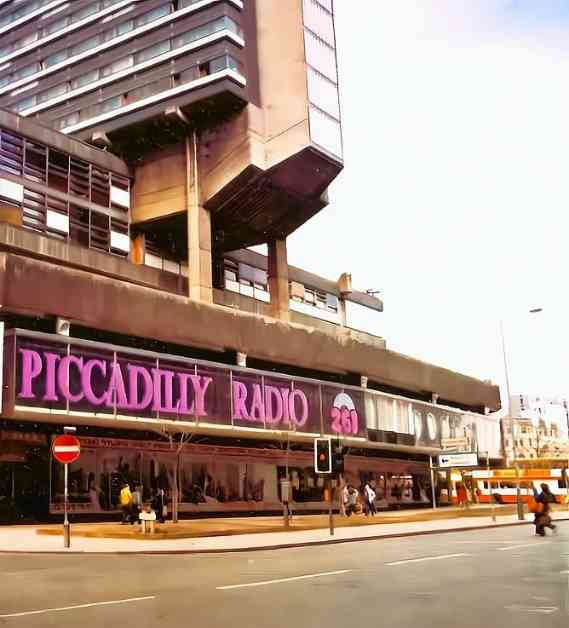Manchester Central Library has been granted funding to preserve the archives of Piccadilly Radio, a beloved radio station in Manchester with a rich history dating back to April 1974. The National Lottery Heritage Fund has awarded a grant of £99,000 to digitize the archive collection of reel-to-reel tapes stored at the library, making them accessible to a new generation of radio enthusiasts and history buffs.
The project is a historic transformation that will bring Piccadilly Radio’s archives into the digital age, allowing for easier browsing and exploration of the station’s rich history. The grant will enable Manchester Central Library to curate 300 Piccadilly Radio clips and ephemera at the Manchester Digital Music Archive (MDMA), making them available to a wider audience.
In addition to the National Lottery grant, Manchester Libraries Trust and former Piccadilly Radio staff have provided match funding to support the project. This collaborative effort highlights the importance of preserving the legacy of Piccadilly Radio and ensuring that its history is accessible to future generations.
The project will be overseen by a newly hired project manager who will ensure that the digitization process is carried out to the highest standard. This individual will work to capture the essence of Piccadilly Radio through the archives, providing a poignant look back at the station’s impact on Manchester and beyond.
To further engage with the community and highlight the significance of the archives, journalism students from the University of Salford will create introductory podcasts featuring former Piccadilly Radio staff members, presenters, and loyal listeners. These podcasts will provide a unique insight into the station’s history and the individuals who helped shape its legacy.
The project grant will also support initiatives to nurture young radio enthusiasts by collaborating with the Manchester Hip Hop archive. Through a 3-month project, young people will learn podcast producing techniques through Piccadilly Radio’s soul and hip-hop shows, fostering a new generation of radio producers and enthusiasts.
In addition to engaging with younger audiences, workshops and reminiscence sessions will be held for older individuals to help them gain new skills and confidence. Training will be provided to 60 volunteers to enhance finding aids, making the archive more accessible to all.
To celebrate the journey of digitizing the Piccadilly Radio archives, a 6-month exhibition will be held at Manchester Central Library next year. Behind-the-scenes tours of the venue will be offered to volunteers, participants, lottery players, and listeners, providing a unique opportunity to explore the history of the radio station.
Everyday access to the digitized archives will be available on library access pods, ensuring that the archives are easily accessible to the public. This initiative is crucial as the reel-to-reel tapes are degrading, and the format is becoming obsolete, highlighting the importance of preserving them in a digital format for future generations.
Members of the public are encouraged to share tapes from shows they recorded at home that are not already in the archives, such as classic shows like Mike Shaft’s “Taking Care Of Business” and Stu Allan’s “Bus Diss.” These contributions will further enrich the archive collection and provide a comprehensive look at the station’s history.
Piccadilly Radio holds a special place in the hearts of many in Manchester, as it was the city’s first commercial radio station to hit the airwaves. The station’s mix of news, music, sports, and drama captivated listeners across generations, launching the careers of talented broadcasters like Mike Sweeney, Susie Mathis, and Mark Radcliffe.
The significance of Piccadilly Radio’s archives is not lost on those who worked at the station, including former producer Tony Ingham, who emphasized the importance of preserving the station’s legacy. As someone who experienced the station’s impact firsthand, Ingham acknowledges the cultural significance and magical memories that will be preserved for current and future generations.
John Hacking, executive member for Skills, Employment, and Leisure, expressed pride in the recognition of Piccadilly Radio’s importance and the project’s collaboration with diverse members of the community. The initiative aims to make the archives accessible to audiences of all ages, ensuring that the station’s legacy continues to resonate with future generations.
Helen Featherstone, director of England, North at The National Lottery Heritage Fund, commended the support of National Lottery players in preserving the Piccadilly Radio collection for years to come. This investment will not only preserve the station’s musical heritage but also provide opportunities for learning and skill development in podcast production and cataloguing.
Brendan O’Shea, chair of Manchester Libraries Trust, highlighted the importance of digitizing the Piccadilly Radio archives to provide insight into a time of significant social and economic change in Manchester. By making the content accessible in a digital format, future generations will have a valuable resource to explore the station’s history.
The project is set to be completed over 12 months, with an official end date in December 2025. The collaborative effort between Manchester Central Library, the National Lottery Heritage Fund, Manchester Libraries Trust, former Piccadilly Radio staff, and the community underscores the importance of preserving the legacy of Piccadilly Radio for generations to come.

